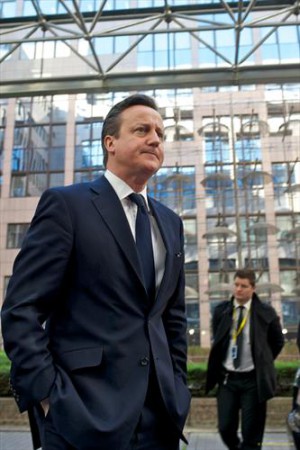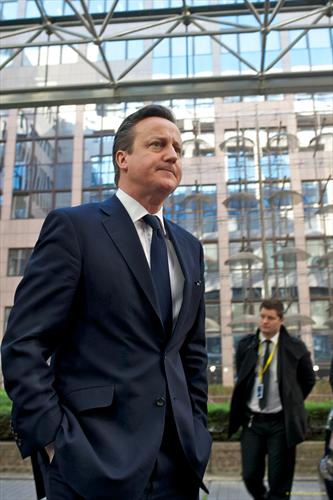Brexit. Is the British necessary for European defense?

(B2) David Cameron will be in Brussels today at the Summit to discuss the future referendum on the Kingdom's accession to the European Union. The hypothesis of a Brexit – the departure of the United Kingdom from the EU – is no longer pure theory. It raises a whole series of questions, in particular for the European Union's security and defense policy (CSDP). Would the British departure be a loss for Defense Europe? The question is sensitive. The answer is clear. Contrary to what some say, the British departure for the CSDP would be painless.
Like in rugby...
Despite the existence of certain capacities at the national level, the British contribution to the CSDP in terms of capabilities is, today, nil or close to nil. And the European Union will very easily survive a departure. Contributions from nations like Latvia, Ireland, Austria or Luxembourg — which cannot be described as a great defense nation — are more important and useful for European military operations than the British contribution! It's hard to say, to assume for our British friends. But that's the sad reality. Without wanting to revive painful memories for our English friends, it's a bit like rugby....
The British contribution in units ... close to 0
During the EUNAVFOR Atalanta operation against piracy, London has only made one ship available since 2008. And this for only a few months. That's barely more than the... Ukrainians! During this time, the Luxembourgers provided two maritime patrol aircraft for several years! It is not a question of means. It is a political will. The United Kingdom preferred to put its ships at the disposal of NATO or the Americans. In many of the other military operations of recent years, moreover, the British presence has often been reduced to 2 or 3 officers. This was the case for EUFOR Tchad, EUFOR RCA... Even for the stabilization operation in Bosnia and Herzegovina (EUFOR Althea) to which the British government holds, as if it were the apple of its eye, the contribution does not is no more important. Ditto for the Somali army training mission (EUTM Somalia), yet described as a "priority" by the British Minister for European Affairs David Lidington as a " top foreign policy priority ! Long gone are the days of Operation Artemis in the Congo (2003), when the contribution across the Channel was significant. The only recent exception is the participation in Operation Sophia (ex EUNAVFOR Med), where London contributes with a ship.
The easily replaceable British contribution
In financial matters too, a British departure would be easily bearable. Quite simply because the costs borne in common are very low. According to the Athena mechanism, which divides the costs between all the Member States according to GDP, the British contribution amounts to 15,6%. The total amounts being quite low, the contribution is also low. In a maritime operation of the EUNAVFOR Med type or training of the EUTM Somalia type, the British share of the common budget amounts to approximately 2 million euros. In the budget of the European Defense Agency, the British contribution is around 5 million euros. Suffice to say that this contribution is easily distributed among the other members.
A blocking political power
British political input into CSDP generally consists of blocking developments: vetoing the EU military HQ or any increase in the budget of the European Defense Agency (currently hovering around 30 million euros), veto to the extension of common costs (let us specify that the United Kingdom is not the only one reluctant, the Germans are not very very warm either), blocking and delaying the operation against piracy which it will then command (EUNAVFOR Atalanta), continual planing of the ambitions posed in terms of CSDP, defense industry, etc.
The "itchy hair of the EU"
The only positive contribution to the Europe of Defense that can be found in the British position is its "itchy" side, its pragmatism, its way of putting on the table disturbing questions that do not dare to ask the other nations. The United Kingdom's grumpiness in terms of CSDP often allows other member states not to show their opposition. It is convenient. Moreover, a participation, even symbolic, of British soldiers, has a reassuring side for a number of Member States. Quite simply because they consider the British army as their common matrix and... also as a useful counterweight to other large countries like France or Germany. The British departure would thus put everyone up against the wall, without being able to take shelter behind London: do they want to build a Europe of Defense together or not?
Welcome to external contributions
A departure of the United Kingdom would not prevent it from continuing to contribute externally to European military operations, as many third countries are doing today, from Georgia to Colombia, via Switzerland, Norway, Serbia or the United States... It will not prevent its participation in the various programs of the European Defense Agency - as long as it signs an agreement (as Norway or Switzerland have already done ). It will not prevent bilateral or multilateral cooperation from prospering (or dawdling...). British participation in the A400M Atlas program or other industrial programs not taking place within the formal framework of the European Union may continue. The British army could even – if it so wishes – be associated with the various politico-military exercises of the EU as are other NATO countries. And, above all, the Kingdom will remain a (medium) military power, a member of NATO. Because, as much in the European Union, London plays a role of retarder, as much it plays in the Atlantic Alliance, an active and useful, even progressive role.
(Nicolas Gros-Verheyde)
Read also on B2 Pro, our analysis (on the Summit discussion on the British referendum): English gentlemen, shoot first!
An observation that is not the same for foreign policy
This observation applies only to CSDP. If we make the same observation for the EU's foreign policy (the CFSP), the observation would be totally different. The British departure would undoubtedly be a real loss. The historical role, its place in the Commonwealth, in Africa or in Asia, its link which remains privileged with the United States (even if it has faded a little), the weight of its diplomacy, its strong position vis-à-vis vis-à-vis Russia, etc. are an undeniable contribution. Without forgetting an important fact: the Union loses a seat on the UN Security Council where London exercises if not a preponderant influence, at least a notable role (at least as important as the French seat). We saw this during the negotiation of a resolution against traffickers on the high seas off the coast of Libya, where the United Kingdom held "the pen" of the adopted text...

